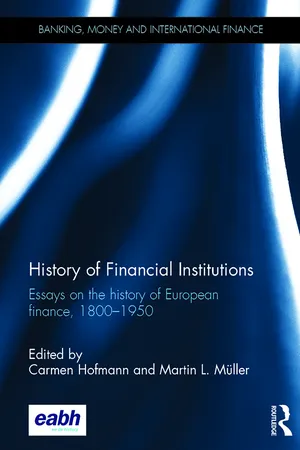
History of Financial Institutions
- 210 pages
- English
- PDF
- Available on iOS & Android
History of Financial Institutions
About This Book
Globalization is not an external force but a result of concrete business decisions made by millions of entrepreneurs and managers across the world. As such, the modern corporation has completely altered the economic landscape; business and finance have shaped the international order of the modern world.
History of Financial Institutions contributes to the analysis of how the modern corporation, business and finance have shaped and keep on shaping our world. In a collection of nine succinct essays, this volume looks at the role of finance in European history from the beginning of the 19th century to the period after the Second World War. Archivists and financial historians, who are also leading scholars of banking and financial history, investigate the ways in which the international post-war order developed. They draw on often hitherto unused archival sources from central banks and other institutions to reveal the unique histories of a variety of European countries and the paths that have led to the contemporary economic and financial system. The collection includes reflections on (monetary) stabilization, inflation, hyperinflation, globalization and public relations in banking and commerce.
This book is essential reading for banking and finance executives, as well as policy makers with a historical interest. It will also be of importance to academics with a particular interest in economic history, financial or banking history, and European history.
Frequently asked questions
Table of contents
- Cover
- Half Title
- Title Page
- Copyright Page
- Table of Contents
- List of tables
- List of contributors
- Preface
- Acknowledgements
- 1. Gerald D. Feldman: an appreciation
- 2. Starting from scratch? The beginnings of Banca Commerciale Italiana: 1893–1894
- 3. Jewish financiers in the City of London: reality and rhetoric, 1830–1914
- 4. The financial culture of the Habsburg Monarchy at the end of the 19th century
- 5. French banks and public opinion: the public’s negative perception of the French banking establishment (from the 1800s to the 1950s)
- 6. ‘Many a slip between cup and lip’: Initiating Austrian stabilisation, 1922–1923
- 7. Why were there no investment trusts in Germany?: An analysis of an anomaly in the German financial industry from 1870 to 1957
- 8. Comradery, the joys of work, and the struggle to improve performance: Creditanstalt–Bankverein’s corporate newspaper, Gemeinschaft, 1939–1943
- 9. A non-neutral, non-belligerent country: Portugal during the Second World War from a financial viewpoint
- Index